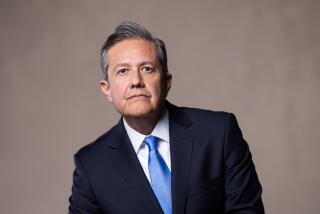Mandela Urges Youth Leaders to Get Education
- Share via
From any other 82-year-old, the advice offered Saturday to two dozen young people might have caused an outbreak of yawning and eye-rolling.
But when former South African President Nelson Mandela urged a group of Los Angeles-area youth leaders to take education seriously, his audience listened.
The anti-apartheid activist urged young representatives of a mixture of local organizations to buckle down and work at improving their own lives now if they expect to improve the lives of others in the future.
“Education is one of the most important weapons you have,” Mandela advised. “It will place you in a far better position to serve yourself and your community. And you cannot advance educationally if you are not disciplined and focused.”
Saturday’s meeting was held at a Century City hotel. It brought together teenagers and young adults from such groups as the Gang Violence Bridging Project, Homie Unidos, the Southern California Islamic Center, the Jewish Federation, All Saints Episcopal Church, the Gay and Lesbian Youth Center and Amnesty International.
It was hosted by the South African consulate in Los Angeles and the locally based Artists for a Free South Africa.
Mandela was an almost mythic figure to some in the crowd. He may have been a mystery to others unfamiliar with his 27-year imprisonment and subsequent five-year stint as South Africa’s first democratically elected president. He retired from public life last year.
“The point is, he was young once and rebellious once and he kept his vision alive, just as you each have dreams,” explained South Africa’s ambassador to the United States, Sheila Sisulu, as she introduced Mandela to the young crowd.
Mandela suggested that poverty is no barrier to those with gumption. There are financial resources available to those who look for them, he said.
“Some of you may have had the background of being with gangs, carrying weapons, peddling drugs,” he said. “There’s no reason you should not change . . . A person with determination can be a role model in their community.”
Asked by 21-year-old Islamic leader Ahmed Younis of Pomona for specific advice about changing society, Mandela suggested that helping kindle more American interest in foreign affairs might be a start.
“There is an impression that Americans, in general, not only youth, have not followed international developments properly,” Mandela said. “I’m not making that statement myself, but there are serious political analysts who say Americans are not well informed as to what has happened in the world.”
Mandela also fielded questions about the importance of prayer from 20-year-old DeJuan Guy from the First AME Church; about South African gang violence from JeJuana Johnson, 20, a Watts anti-gang worker from the Community Self Determination Institute; about the AIDS epidemic from 22-year-old April Lambey of the group Reach L.A.; and about American gang problems from 17-year-old Sylmar resident Jesse Murray, a representative of the National Conference on Community and Justice.
Omari Trice, 22, a Mid-City resident representing musician Quincy Jones’ Listen Up Foundation, said Mandela left him pumped up.
“He’s a person who set the tone for an entire nation,” said Trice, who was among a group of Los Angeles residents who spent several weeks building Habitat for Humanity homes this summer in South Africa.
“You come away feeling you need to be Superman in order to get things done,” Trice said.
More to Read
Sign up for Essential California
The most important California stories and recommendations in your inbox every morning.
You may occasionally receive promotional content from the Los Angeles Times.














